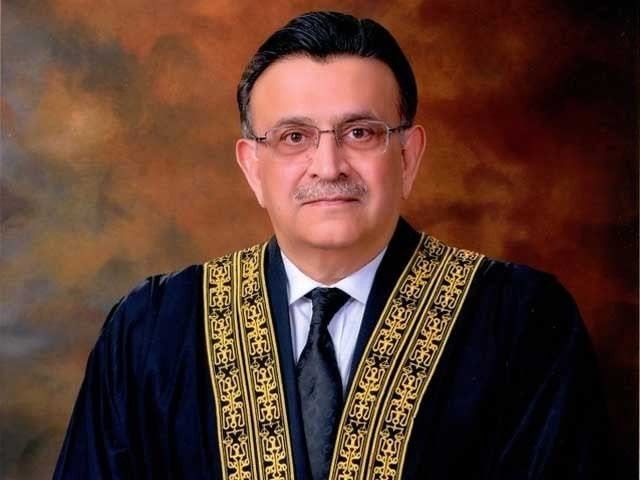Following Constitution is duty, not choice: CJ
Top judge says decisions should be made as per the law and Constitution

Chief Justice of Pakistan Umar Ata Bandial on Sunday noted that if the Constitution mandated that elections should be held within 90 days after the dissolution of an assembly, then the Supreme Court would have no other option but to implement it.
“When it comes to constitutional enforcement we [SC judges] must not blink our eyes. If it says 90 days for holding the polls, it is our duty to say that and not our choice,” the top judge added while speaking at a conference named after the late CJP AR Cornelius held in Lahore on the issues faced by minorities.
The CJP's remarks come at a time when discussions among political parties are under way on the issue of simultaneous elections across the country, following an order by the top court to hold the elections in Punjab on May 14.
However, the government has repeatedly shown its reluctance to hold the polls. Instead, it has been urging to hold them later in the year.
Chief Justice Bandial remarked that the court had been informed that negotiations between political parties were under way for holding same-day elections across the country.
However, he added that the SC judges had nothing to do with this matter. The CJP said that political parties realised that it was their duty to uphold the Constitution.
“We [SC judges] are there to support them, otherwise our decision is there,” he continued, referring to the top court’s April 4 verdict to hold the polls in Punjab on May 14.
Read Govt seeks to quash pleas against suo motu law
Noting that decisions should be made as per the law and Constitution, Justice Bandial remarked that those judgments carried moral authority.
The top judge maintained that the minorities in the country enjoyed complete freedom and the Constitution guaranteed their rights as well as protection.
He recalled that Justice Cornelius, the fourth CJP of the country and the first Christian one as well, had opposed the governor-general's dissolution of the constituent assembly in 1954.
Justice Bandial further pointed out that in 1964, two provinces had banned the Jamaat-e-Islami. However, he added that this ban was lifted in its founding chief Abul Ala Maududi’s case.
The CJP observed that the growing extremism in the country had claimed countless lives over three decades. He noted that the courts could not pass executive orders.
“Every citizen of Pakistan has fundamental rights and the protection of the Constitution is one of our prime duties,” he continued. Justice Bandial maintained that the SC had the authority to decide on basic human rights.
He noted that Justice Cornelius had observed that executive officers could not decide on fundamental rights. The top judge maintained that the decision of the courts had moral authority. “If a court decision is not challenged, it becomes final,” he added.
Chief Justice Bandial observed that they had gathered to pay tribute to their senior, Justice Cornelius. “Justice Cornelius was the epitome of justice. Apart from law, he excelled in many other fields,” he added.
The CJP noted that Justice Cornelius had studied from the highest institutions of the world. “He [Justice Cornelius] could have been appointed to the civil service but chose the field of law and justice,” the top judge pointed out.
The CJP further observed that Justice Cornelius had given 17 years to the SC. “He [Justice Cornelius] was a good jurist and led a simple life. So his life is an example for judges,” the CJP added.
Speaking on the occasion, former CJP Tassaduq Hussain Jillani noted that he was honoured to be present at the conference. He observed that the country's system should be run on the basis of democratic values and principles of equality.
Read more SC distances itself from govt-PTI talks on polls
The former top judge pointed out that the low literacy rate in the country had promoted religious extremism. Justice (retd) Jillani remarked that the protection of fundamental human rights was the primary responsibility of the judiciary.
He added that the judiciary had to play its role in providing awareness to the people about the Constitution. He observed that the implementation of human rights was the State's first priority. He continued that the implementation of court orders was the top priority of State institutions.
Last week, the SC distanced itself from the negotiations between the government and PTI over holding the elections for the national and all provincial assemblies on one date, observing that they were entirely their own effort without any direction or order by it.
However, a three-judge bench of the top court, comprising Chief Justice of Pakistan Bandial, Justice Ijazul Ahsan and Justice Munib Akhtar, while hearing a constitutional petition filed by a citizen, who sought elections for all assemblies on one date, appreciated the initiative taken by the political parties.
“The court appreciates the efforts of all parties to try to end the current political impasse and in particular their voluntary agreement to enter into negotiations to choose a single date for holding general elections to the National Assembly and the four provincial assemblies,” the SC order issued on April 27 read.
The court also made it clear in the order that its April 4 verdict – that the elections in Punjab would be held on May 14 – would remain unchanged.



















COMMENTS
Comments are moderated and generally will be posted if they are on-topic and not abusive.
For more information, please see our Comments FAQ